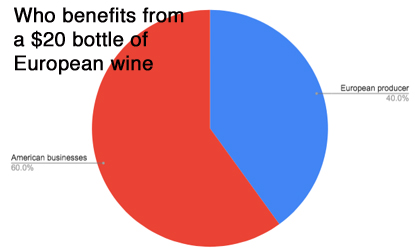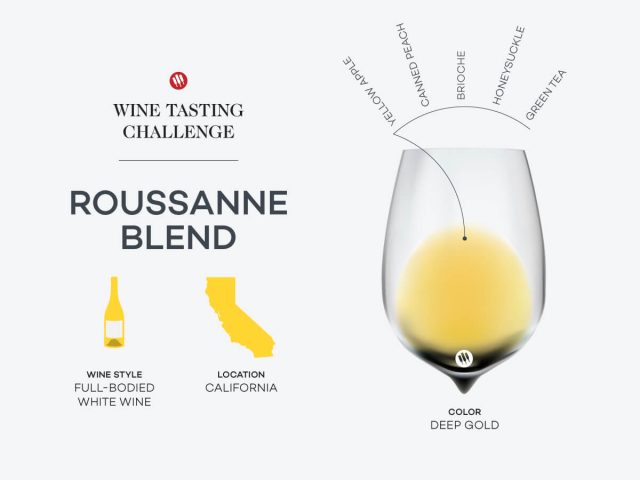Wine tariff comment period ends today

Tariffs of 100% may soon hit European wines in America. The price of some wines will double. But mostly it will mean that many of the most coveted wines will no longer be available. The comment period ends today at midnight over at the site of the United States Trade Representative. Fully 24,071 people have submitted comments. Add yours! My take on the situation is that it’s a code red: after “big, beautiful” negotiation with China and a new agreement in North America, the administration is more likely to turn to Europe. Hopefully, cooler heads will prevail…Anyway, I made a pie chart! It shows that more American businesses profit from a bottle of European wine than the producer. Overly simple, but trying to make the point that these tariffs are an own goal.
Here are three pieces I wrote on tariffs for Wine & Spirits magazine last month. And here’s my letter to the USTR:
January 13, 2020
Ambassador Robert Lighthizer,
I am writing to express my concern regarding the escalation of tariffs on wine.
The matter is the Section 301 in the Large Civil Aircraft dispute. On October 18, the tariff was raised to 25% on a variety of European wines; the prosed escalation would put that tariff at 100%. I am the author of two wine books, including one called Wine Politics.
Wine is popular in America today. Sales of wine have risen on a per capita basis for 25 consecutive years. European wines provide many of the most expensive wines in the market. But they also account for almost a quarter of the best selling wines at Pennsylvania Liquor Control Board shops. So it affects consumers of wines from the top shelf to the bottom in all 50 states.
While the intent is to inflict economic pain on Europeans in the context of the aircraft dispute, the most immediate effect would be (and has been since October) felt on American businesses. The proposed 100% tariff would effectively shut European wines out of the US market. An unintended consequence of the action would be to devastate small distributors. These same distributors who sell small production wines from Europe also sell small production wines from the US. The repeal of Prohibition set up a so-called “three-tier system” that compels domestic wineries (as well as imported wine) to use a distributor to sell their wines out of their home state. Inflicting economic damage on the distributor tier through tariffs would also limit outlets for some of the most exciting American wineries.
For a European wine that sells for $20 on the shelf in, say, Wisconsin or Michigan, only about $8 of that goes to a European winery. Thus more than half goes to American businesses. And when that wine is sold in a restaurant in, say, Ohio, the profit for American business is even more because the restaurant depends on wine to be a draw for guests as well as a center for profits.
An additional point worth considering in international trade is that this action would be a win for China. The world’s top wines are produced in minuscule quantities where global demand far outstrips supply. So if the share reserved for the American market no longer comes to our shores, the Europeans will easily sell it elsewhere, such as China, and suffer no economic hardship whatsoever. Thus the Chinese would not only be eating our lunch, but also drinking wine intended for us.
I understand your frustration in the large civil aircraft dispute, which has been ongoing since 2004. But I encourage you to keep the action areas limited to aircraft, where the tariff rate is already lower than agricultural products. The EU may have the WTO rule in their favor and might then impose retaliatory tariffs on an assortment of US goods, including US wine.
Uncertainty as already led to a noticeable reduction in European wines in our supply chain. If tariffs are further escalated on wine—which I hope they are not—I strongly encourage you to at least set an effective date three to six months out, which would provide some stability and help mitigate economic hardship on American businesses.
Thank you.




